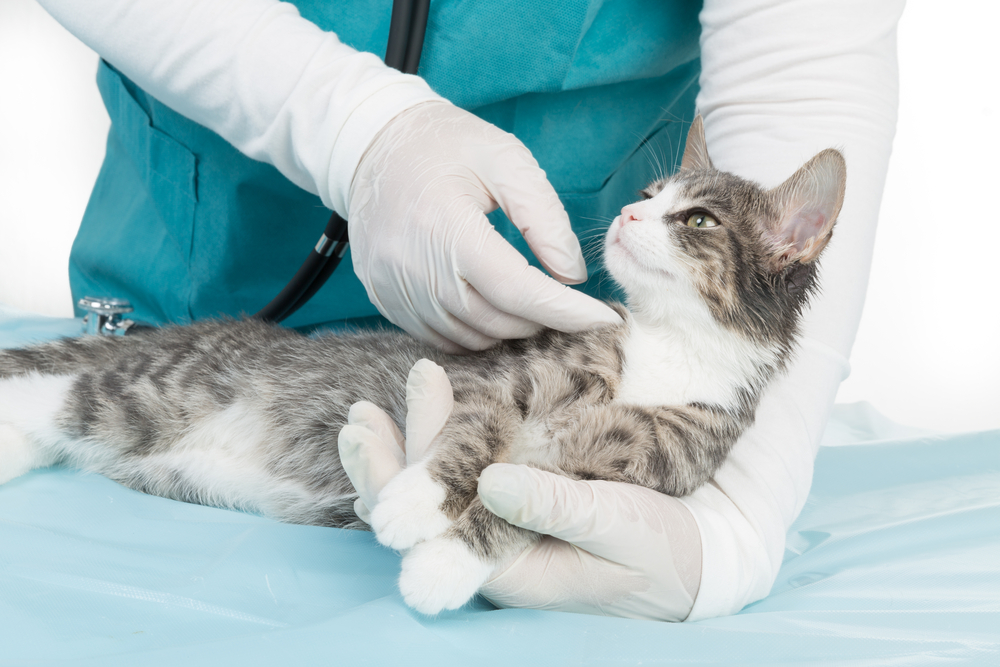Whether you are thinking of adopting a new puppy or kitten, or a lifetime pet owner considering pet insurance for your furry companion, you may be wondering, “how much does a vet visit cost?”or “what is pet insurance?”. From routine vet visits for pet preventative care to those emergency vet visits, it is important to budget for your pet’s medical care. Like so many questions, “how much does a vet cost?” doesn’t have any simple answers—but we can help give you guidelines on what to expect regarding the price of veterinary services!
Average Costs of Tests and Services
It is crucial to understand that a pet owner’s total vet visit cost will vary depending on the type of pet care that is needed.
- Routine checkups: $50 to $250
- Vaccines per shot: $15 to $28
- Physical exams: $45 to $55
- Dental Cleaning: $500 to $1,000
- Allergy testing: $200 to $300
- Spay/neuter: $300 to $800
- Fecal exam: $25 to $45
- Geriatric screening: $85 to $110
- Heartworm test: $45 to $50
Wellness Care & Preventative Medicine
Just like everything else, the cost of veterinary services varies across the country depending on the local cost of living. Additionally, the cost for preventative medications (such as flea/tick and heartworm prevention) is higher for larger pets, since they need a higher dosage based on their body weight.
In general, though, you can expect to pay about $500-$1,500 a year for wellness care services. The amount you spend will vary based on diseases of concern in your geographic location, which vaccines are needed for your pet’s lifestyle, and whether you have a cat or a dog (cats need fewer vaccines than dogs do!). But for all of that money, what are you actually paying for?
What if My Pet Needs Emergency Care?
As pet owners, it is important to be aware that accidents happen and your pet may need to be brought in for an emergency vet visit. A veterinary bill, especially if it is for emergency care, can be VERY expensive. The Emergency Vets USA has gathered the average costs of emergency veterinary care services, which has been listed below.
Average costs of emergency vet visits in the U.S:
- General consultation/exam: $100-$150
- General blood work: $80-200
- X-rays: $150-$250
- Ultrasound: $300-$600
- 1-2 day hospitalization: $600-$1,700
- 3-5 day hospitalization: $1,500-$3,500
- Wound treatment and repair: $800-$1,500
- Emergency surgery: $800-$2,500
- Oxygen therapy: $500
The Annual Wellness Exam
Veterinarians recommend that most healthy dogs and cats visit the veterinarian for preventative care at least once a year, and sometimes every six months. Wellness visits include a complete and thorough physical exam to identify any areas of concern for your pet before they develop into a larger medical issue. Your veterinarian will examine your pet’s eyes/vision, ears, teeth/mouth, listen to their heart and lungs, palpate their abdomen for any organ enlargement, and assess your pet’s skin, lymph nodes, and joints. Since our pets can’t talk to us, regular physical exams by your veterinarian are essential for picking up early clues of illness–even if the pet parent does not perceive that anything is amiss.
Vaccinations and Boosters
Along with the physical exam, your veterinarian will recommend vaccinations to prevent contagious (and often deadly) diseases. These recommendations are tailor-made to your pet’s age, lifestyle, and geographic location. Some infectious diseases are more common in certain parts of the country, while others are not encountered often enough to justify a vaccination in an individual pet unless they travel to another area.
Routine Lab Testing
In addition, lab testing is performed to screen your pet for certain infections. For dogs and cats, a fecal exam is recommended at least once a year (and often every six months). This test looks for the microscopic eggs of intestinal parasites, which can infect your dog or cat when they nose around and lick the ground outside, or eat bugs and other undesirable things (including dead animals!)!
A blood test to screen your dog for heartworm infection is also recommended every six to twelve months. Heartworm disease is a parasitic infection as well—but this worm lives in the heart and lungs, and can cause heart failure and death. It is transmitted from dog to dog by mosquito bites, which we all know are impossible to prevent! Fortunately, there are safe and effective medications to prevent an actual infection from taking place—and your veterinarian will discuss these with you.
Blood and Urine Testing
Bloodwork to evaluate your pet’s internal organ function is also recommended at least once a year, and sometimes every six months if your pet is older or has an underlying condition that needs more frequent monitoring. Wellness blood work evaluates your pet’s red blood cells, white blood cells, blood sugar, electrolyte levels, kidney enzymes, liver enzymes, and more. A urinalysis will provide further information on your dog’s kidney function, hydration status, and bladder health. If something is not normal and requires further investigation, you will be glad that the condition was caught early enough for your veterinarian to intervene and help your precious pet.
Annual Dental Cleanings
A dental cleaning under anesthesia is usually recommended once a year as well, depending on the level of tartar and calculus build-up noted at the time of your pet’s physical exam (see our article on “Everything You Need to Know About Dental Health” for more). This expense varies on the type of anesthesia used, the size of the patient, and whether tooth extractions are needed. Typically, price ranges for this procedure alone can range from $500-$1,000—or more, if extractions are necessary.
Flea, Tick, and Heartworm Prevention
The last piece of the wellness care puzzle is year-round flea, tick, and heartworm prevention. (Note: in some colder northern climates with few mosquitos, your veterinarian may recommend heartworm prevention only part of the year.) These preventatives help keep your pet healthy, happy, and comfortable by preventing the transmission of diseases by ticks, fleas, and mosquitos.
There are many options available and in various weight ranges for pets of all sizes. As always, medications for larger/heavier dogs are more expensive than for smaller dogs—because the amount of active ingredients is higher. Check with your veterinarian for their recommendations for your local area.
What About When My Pet is Sick?
While most pet owners can budget for the cost of routine wellness care, many live in fear of unexpected emergency vet bills. Knowing how to pay for vet bills can be a complicated situation. Vomiting and diarrhea are some of the most common reasons why an ill pet needs to see a veterinarian. Testing to identify or rule out causes of these symptoms can include bloodwork, radiographs (x-rays), and more—and add up to another $600-1,000 or so, depending on your local cost of living and the type of equipment your veterinarian has available.
For more serious medical issues requiring hospitalization at a 24-hour hospital, costs can quickly approach a thousand dollars (or more!) per day. That may sound like a lot, but this lifesaving care is provided by doctors and staff who are extraordinarily well-trained and well-equipped with the latest in lifesaving care at their fingertips to help your pet. Consultations with different specialists, such as a surgeon or cardiologist, can often be coordinated at these facilities if your pet needs them, too.
Emergency surgeries are often performed to remove objects from a pet’s intestinal tract (such as string, pieces of toys, socks and other items they swallow!), or if a pet has a life-threatening abdominal injury or bleeding tumor. These surgeries can quickly approach $5,000-10,000 in costs, but often are the only way to save your pet’s life in a true emergency situation.
We all know our pet’s love is priceless—but sometimes, these unexpected costs can be daunting. See our article on “Tips on Paying for Vet Care” for more about how to handle an emergency situation that we all hope NEVER happens to your pet. As always, it is better to be safe than sorry!
Spaying/Neutering
A special case to discuss in any conversation about pet health care costs is spaying and neutering your pet. Most pet owners in America decide to have their dogs and cats “fixed” to prevent certain diseases later in life, and to prevent unwanted pregnancy (along with some behaviors influenced by the sex hormones, such as urine marking by male dogs).
The cost of spaying and neutering varies widely depending on both your local cost of living and the quality of anesthetic drugs and anesthesia monitoring involved in your pet’s surgery. In addition, it is often more expensive to spay or neuter a larger/heavier dog than a smaller one—since all of your pet’s anesthetic and pain medications are dosed by their body weight. You are literally “paying by the pound” for medications throughout your pet’s life!
Spays and Neuters at a Low Cost Facility vs Full Service Vet Clinic
While some non-profit facilities offer discounted spay and neuter services of only a hundred dollars or so, this procedure is more expensive at a full-service clinic. Why is that? Well, there are many reasons for this price discrepancy—even though the end result (a spayed or neutered pet) is the same.
A veterinary hospital usually has more staff assigned to your pet’s well-being before, during, and after anesthesia than a non-profit can afford. Also, many shelters and humane societies forego additional safety measures—like pre-anesthetic bloodwork, and IV fluids during the procedure—for apparently healthy pets, in favor of reducing costs. While the veterinarians at shelters are extremely skilled surgeons and fast at the procedure, sometimes these safety measures are truly necessary—and we don’t always know when they will be needed in an individual pet ahead of time. In case of a rare anesthetic emergency, proper monitoring equipment, plenty of staff, and access to your pet’s veins for life-saving medication can mean the difference between life and death for your pet.
There are other factors differentiating the level of care your pet receives at a low-cost facility versus a veterinary hospital. For instance, if there is a problem after surgery, such as an infection or incision issue, low-cost facilities generally do not have the ability to follow up with your pet and instead refer you to a local family veterinarian. Finally, at a full-service veterinary hospital, there are no charitable contributions or government funds subsidizing your pet’s surgery—so the pet owner is responsible for the cost.
For these reasons, you can expect to pay $300-800 or so for your cat or dog’s spay/neuter surgery at a private hospital. It may surprise you to know that, even at these prices, there is often not a significant profit to be made from these surgeries at a veterinary clinic. Spaying and neutering is considered so important to your pet’s health that veterinarians sometimes even lose money by providing these much-needed surgeries!
Pet Health Insurance
Investing in pet health insurance is a great way to help cover your expenses as veterinary costs, emergency treatment, or even prescribed veterinary medicine can be costly. Picking the appropriate pet health insurance plan with the best coverage will not only benefit your pet, but will also allow you to save money in the bank!
The Bottom Line
While the cost of veterinary care can definitely add up, it’s worth thinking about your personal budget for both your pet’s yearly wellness care needs—to try to prevent a more expensive problem down the road!—and to have a plan in case your pet has a true emergency. Your AskVet team is here to help you maximize your pet’s health, and determine when a vet visit is truly necessary.
Our AskVet veterinary [professionals are available to discuss all of your pet’s needs 24 hours a day, 7 days a week. Whether you have an immediate need or are looking to improve your pet’s overall wellbeing, just sign into your account and one of our friendly and knowledgeable veterinary experts will attend to your needs, no appointment required!
Sources:
https://emergencyvetsusa.com/average-cost-of-emergency-vet-visits/
Written by:
Allison Ward, DVM
Dr. Allison Ward grew up in the suburbs of Washington, D.C. and started working in veterinary hospitals when she was 14 years old. After graduating from veterinary school in 2011, she completed a small animal rotating internship in New Jersey, followed by a neurology/neurosurgery internship in Miami. After completing this advanced training, Dr. Ward then moved on to general small animal practice. Dr. Ward’s professional interests include feline medicine, neurology, and pain management. Her passion for educating pet owners carries over into her work with AskVet, and she loves being able to help pets and their parents at all times of the day (and night!). She currently resides in sunny south Florida with her two cats, Larry and George.






